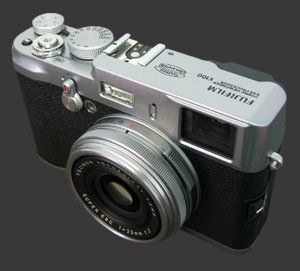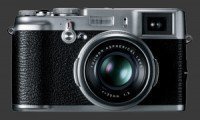Fujifilm Finepix X100 Review
Fujifilm Finepix X100 Performance - How well does it take pictures?
While the most attractive aspect of the Fuji Finepix X100 is clearly its external design, it ends up excelling far more in its performance than usability, once again demonstrating technological achievements by Fuji.
The 12 megapixels CMOS sensor in the X100 captures images of very high quality. Just as expected, noise-level and dynamic-range compare well to the performance of modern cropped-sensor DSLRs. Image noise is very low until ISO 800 where it starts picking up very gently. ISO 3200 is the point where it becomes noticeable but only in large prints. ISO 6400 requires reduced print sizes to appear smooth but even ISO 12800 is usable for medium prints such as 8x12". There is a hint of softness above the base ISO, indicating noise-reduction at work. The camera itself does not let noise-reduction to be turned off, so those who want to perform their own NR have to shoot RAW.
The dynamic range of the Fuji Finepix X100 is absolutely stellar. How it is rendered into JPEG files is highly influenced by image parameters. For the very best output, you must use Provia film-simulation mode, which thankfully is the default. Then, at ISO 400, DR can be set to 200% which adds an extra stop. At ISO 800, DR can be set to 400% which another stop yet again, giving the widest dynamic range we have seen from any camera to date.
The Fujinon 23mm F/2 lens is a superb achievement. It is perfectly sharp from F/2 except at the extreme corners of images. The corners sharpen nicely at each stop down from the maximum with the sweet-spot around F/5.6. There is no noticeable distortion or vignetting either. Purple fringing is a rarety for this lens, appearing only when shooting directly at strong light sources.

Color accuracy is good when using Provia film-simulation with Mid color. A bit more punch can be added without looking artificial by using Mid High color. The default sharpness setting is great and certainly much better than most cameras. There is independent control over shadow and highlight tones. Highlights look best with the Soft setting, while shadows looks best with the Standard setting. This reduces clipping of bright tones while keeping good contrast in the shadow areas.
Automatic while-balance is good but not perfect. In typical outdoor conditions, it generally does very well. In the presence of artificial light, mostly tungsten, it leaves a noticeable yellowish cast. Switching to a white-balance preset corrects this in most situations. Custom white-balance works as expected.

Metering is surprisingly reliable, mostly because the preview is not always exposure-priority. The Fuji Finepix X100 copes well and generally avoids over-exposure except for particularly dark scenes. Under-exposure is extremely rare.
Speed of the X100 is generally good except for autofocus. The Contrast-Detect system in this camera needs a good amount of contrast to focus with any semblance of speed. In ideal conditions it takes just under ½s to focus, but the average focus time is closer to 1s. It also gives up more often than most recent cameras.
The all-important shutter-lag is quick followed by a short-but-noticeable black-out. Following a shot, the next shot can be taken 1½s later while using MF or 2-3s later while using autofocus. The X100 is mostly responsive except during file-writes. If you saved money by buying a slow memory card, this camera will make you pay for it. Those shooting RAW files will be much more affected due to the higher data-volume.
 Continuous shooting offers both 5 and 3 FPS. In either case, the bursts are short, lasting 3.3s at most and are followed by a lengthy write time. The one feature that is exceptionally fast is the Motion Panorama mode which shows the results shortly after completing the pan. For some reason, the X100 makes the user pan through a greater angle than required. Bracketing is quite fast too. AEB and Dynamic-Range bracketing are performed as real brackets but ISO and FSB are both performed virtually, so one shot is taken but it is saved three times with different settings. Surprisingly this includes ISO.
Continuous shooting offers both 5 and 3 FPS. In either case, the bursts are short, lasting 3.3s at most and are followed by a lengthy write time. The one feature that is exceptionally fast is the Motion Panorama mode which shows the results shortly after completing the pan. For some reason, the X100 makes the user pan through a greater angle than required. Bracketing is quite fast too. AEB and Dynamic-Range bracketing are performed as real brackets but ISO and FSB are both performed virtually, so one shot is taken but it is saved three times with different settings. Surprisingly this includes ISO.
Battery life is quoted at 300 shots according to the CIPA standard requiring 50% flash use. This is below average but not by much for a modern camera. Given the camera's exceptional ISO performance though, you can easily stretch this by using the flash less often.
Fujifilm Finepix X100 Performance - How well does it shoot video?
 The X100 captures 720p HD video at 24 FPS with stereo sound from its built-in microphone. Videos are stored a 1280x720 @ 24 PFS progressive using the H.264 codec in a Quicktime wrapper.
The X100 captures 720p HD video at 24 FPS with stereo sound from its built-in microphone. Videos are stored a 1280x720 @ 24 PFS progressive using the H.264 codec in a Quicktime wrapper.
This digital camera has a dedicated movie mode hidden as one of the Drive mode options. When entered, it previews the correct framing and sets the hybrid viewfinder to EVF mode. Both aperture and EC can be set before recording starts but changes while recording are ignored. The focus mode is either continuous or manual. Even when the focus mode switch is set to AF-S, AF-C is used. This seems like a bug but it matters very little because videos always work out better using manual focus.
Thanks to the dedicated mode, videos start instantly with a full-press of the shutter-release. It also stops immediately at a half-press. This is definitely one of the most seamless video experiences we have seen in a while. Sound quality is actually quite good for a built-in microphone. This may be partly due to its short range but it was nice to not hear wind blowing in every outdoor video.
Video quality is good but not as crisp as class-leading competitors. Exposure, color and white-balance are similar to that of images. The X100 automatically adjusts video exposure according to changes in brightness. Since it does so in small increments, transitions comes out relatively smooth.
Fujifilm Finepix X100 Conclusion
The Fuji Finepix X100 produces the very best image quality among any fixed-lens camera to date, even matching modern SLRs using the same APS-C sensor size. Noise levels are well controlled with slight smudging due to noise reduction, amazing dynamic-range, good exposure, pleasing color and accurate white-balance. The lens is exceptionally sharp with virtually no distortion or vignetting.
Having access to such an excellent performance in a relatively compact model, is probably reason enough to want one and overlook its share of oddities. Despite the analog design and the number of external controls, the ergonomics of the X100 are far from perfect. Still, one is likely to get used to some of those quirks after a while. Having a built-in EVF seamlessly fitting into such a camera is a really nice and unique bonus.
There are two reasons for passing on the X100 if you can afford one and they both depend on its intended use. The first one is obviously the fixed 23mm lens. If it does not fit the bill, it just does not. The second is its slow autofocus performance which is a deal-breaker for action. For more casual photography, including portraits and social occasions, AF-speed may still be adequate.
Fuji is entering a unique and undefined market with the X100, a model that attracted a huge amount of interest right from its announcement. High-quality and small have long been opposites among digital cameras and the question is what compromises are people willing to accept for such camera? The only challengers to the X100 are Micro Four-Thirds cameras which have been shrinking by shedding external controls segmenting towards a different target audience.
 |
Please Support Neocamera
All information on Neocamera is provided free of charge yet running this website is a huge endeavor. Purchases made via affiliate links found throughout the site help keep it running and up-to-date. There is no additional cost to you, so please consider buying via these links to our affilates:
If you found any information on this site valuable and did not purchase via our affiliate links, please considering donating via PayPal:
Any amount will be greatly appreaciated. Thank you for your support!
Fujifilm X100 Highlights

Sensor-Size: 24 x 16mm

Actual size when viewed at 100 DPI
| 12 Megapixels Fixed Lens | ISO 100-12800 |
| Fixed 35mm lens | Shutter 1/4000-30s |
| 0.47" Hybrid EVF 1.4 Megapixels (0.50X) | Full manual controls, including Manual Focus |
| Automatic Eye-Start sensor | Custom white-balance with 2 axis fine-tuning |
| 5 FPS Drive, 10 Images | Spot-Metering |
| 1280x720 @ 24 FPS Video Recording | Hot-Shoe |
| 2.8" LCD 460K Pixels | Lithium-Ion Battery |
| Secure Digital Extended Capacity |
Updates
2024.11.18

Best 2024 Photography Gifts for Every Budget
Great gifts for photographers and photo enthusiasts selected for every budget among the best products of 2024.
2024.08.07

Eye Protection Tips for Professional Photographers
The four main considerations for professional photographers regarding eyewear.
2024.07.14

Fujifilm X100VI Review
Flagship fixed-lens compact digital camera with a 40 MP sensor and Image-Stabilization, a first for the series. Retro design featuring dual control-dials, plus direct ISO, Shutter-Speed and EC dials. Its hybrid viewfinder can switch between EVF and OVF mode.
2024.05.09

Fujifilm GFX100 II Review
Flagship 102 Megapixels Medium-Format Mirrorless Digital Camera with 8-Stop 5-Axis IBIS, 8 FPS Drive, 8K Video and 400 MP Super-Resolution capture in a weatherproof and freezeproof body with dual control-dials and dual memory-card slots.
2024.04.03

Fujifilm X-T5 Review
Newest Fujifilm flagship boasting a 40 MP APS-C sensor, 5-axis IBIS with 7-stop efficiency, 15 FPS continuous drive, 6.2K Video capture, dual control-dials and dual SDXC UHS-II slots in a sturdy weatherproof and freezeproof body.
2023.11.20

Best Digital Cameras of 2023
Find out which are the Best Digital Cameras of 2023. All the new Mirrorless Digital Cameras from entry-level to high-end professional.
2023.07.10

Fujifilm X-H2 Review
40 Megapixels APS-C Hybrid Mirrorless Digital Camera with 7-stop IBIS. Fastest shutter ever and 8K video capture. Large builtin EVF with 0.8X magnification and 5.8 MP, plus an Eye-Start Sensor. Packed with features and large number of controls in a weatherproof and freezeproof body.
2023.05.07

Sony FE 20-70mm F/4G Review
Review of the unique Sony FE 20-70mm F/4G lens. The optical zoom of this lens spans ultra-wide-angle and medium focal-length coverage, making it one of the most versatile Full-Frame lenses on the market.
2023.01.15

Huion Inspiroy Dial 2 Review
Review of the Huion Inspiroy Dial 2 tablet, a medium sized drawing surface with dual dials and customizable buttons. Connects via USB-C or Bluetooth 5.0 with Windows, Linux and Android support.
2022.12.08

How to Pack for a Photo Trip
Find out how to pack for a travel photography trip, carry your gear safely while meeting airline regulations.
2022.11.13

Best Digital Cameras of 2022
The best digital cameras of 2022. A short list of the most outstanding models in their respective categories. Choose one for yourself or as a gift.
2022.09.21

Pentax DA* 60-250mm F/4 SDM Review
Review of the Pentax DA* 60-250mm F/4 SDM, the constant-aperture telephoto zoom with the highest zoom-ratio on the market.












